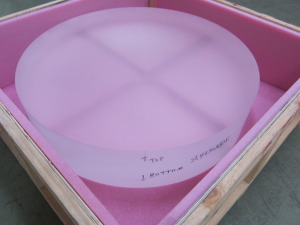Oct 20 2014
The Heising-Simons Foundation has awarded $1.1M to the DESI project with the goal of helping to fabricate the unique optics needed to capture spectra of the young expanding universe.
 A DESI lens begins its life as a lens blank (above), an ultra-pure cylinder of glass that is carefully ground and polished over many months. Credit: Ohara Corp, Japan
A DESI lens begins its life as a lens blank (above), an ultra-pure cylinder of glass that is carefully ground and polished over many months. Credit: Ohara Corp, Japan
The funding comes on the heels of DESI’s CD-1 review by the Department of Energy’s Office of Project Assessment, which in September favorably reviewed the project’s concept and budget range. The award comes ahead of official Congressional approval for DESI project construction, after which federal funding is expected to become available. DESI is managed by the Department of Energy’s Lawrence Berkeley National Lab (Berkeley Lab).
“Having this private funding is transformative for a DOE project,” says Michael Levi, Berkeley Lab physicist and DESI project director. “It allows us to get our long-lead procurements out of the way.” The specialized optics for the telescope are large and take months to grind and polish. “This funding probably saves us about two years in the project,” he says.
DESI will use these lenses to study the most pressing mysteries of the universe today: dark energy, the expansion of the infant universe, and the current acceleration of this expansion. By capturing the light of 30 million galaxies, DESI will provide a 3D map of the universe going back 10 billion years. In addition, DESI will give an upper limit to the total mass of all neutrinos in the universe by looking at the way these weakly interacting particles affect the formation of large-scale structures like galaxy groups and clusters.
Kitt Peak Observatory will house the project. DESI will transform the existing Mayall 4-meter telescope with a new optical corrector made of the new specialized optics, lenses 1-meter in diameter. The Gordon and Betty Moore Foundation has already funded two lenses. The Heising-Simons Foundation funds will support the remaining two, which will be manufactured at Corning in New York.
The new DESI telescope could begin operation as early as 2018, pending Congressional approval. The Heising-Simons Foundation grant period extends to September 2016, providing essential, well-timed funds to allow a smooth transition of the Mayall telescope and maintain an optimal DESI start date.
Established in 2007 by Mark Heising and Elizabeth Simons, the Heising-Simons Foundation (www.heisingsimons.org) is dedicated to advancing sustainable solutions in the environment, supporting groundbreaking research in science, and enhancing the education of children.